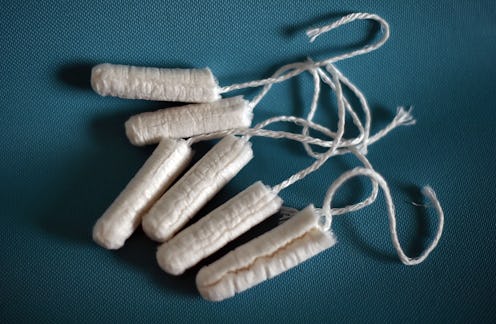
There are a lot of negative attitudes and hidden biases that hinder girls' success from a young age, but there's also one very concrete factor that can hold them behind: lack of access to menstrual supplies. When kids' basic health and hygiene are at stake, after all, learning becomes difficult to prioritize. And, as a new study confirms, just providing pads can go a long way toward ensuring that girls stay in school.
The Oxford University study, published in PLOS ONE, looked at 1,000 female students at eight Ugandan schools over the course of a year and a half. On average, girls at schools with free pads, puberty classes, or both attended school three and a half days a month more than those at schools without either.
In this particular area, there's a dramatic difference between boys' and girls' learning levels. 69 percent of the boys but only 54 percent of the girls can read, which could partially be a result of unequal attendance. In addition, many girls in Uganda drop out of school when they reach their teen years.
These findings confirm earlier ones showing that difficulty dealing with periods can lead kids to miss school. According to one UNICEF and Emory University study, 30 percent of girls in Afghanistan and 21 percent in Sierra Leone had skipped school because of their periods. A survey by the period-tracking app Clue found that 17 percent of people with periods had missed something significant, like school or work, because they didn't want people to know they were menstruating.
Access to menstrual supplies is a problem not just for kids but also for vulnerable populations like the homeless and people in prison. New York City is the only city in the country that requires supplies to be provided in homeless shelters, prisons, and public schools.
The larger issue underlying all these problems is the menstruation taboo. When we can't even talk about periods, it becomes difficult for us to accommodate them. According to Clue's survey, there are over 5,000 words around the world to avoid mentioning periods explicitly. Fourteen percent of the survey's respondents didn't feel like they could talk to women about their periods, and a whopping 66 percent couldn't talk to men about them.
This could be why the new Oxford study found that puberty lessons, as well as free pads, were so effective in increasing attendance. "Many girls don't know about periods before they encounter their first one," study author Paul Montgomery explained in a press release. "They are totally unprepared because they receive no information or training on how to manage them. Just by giving girls lessons in puberty or a purpose-built sanitary pad means they were more likely to stay at school during their periods, minimizing the risk of disruption to their schooling. Simple interventions like these can have major long-term economic implications for women in low and middle income countries, which socially empowers them."